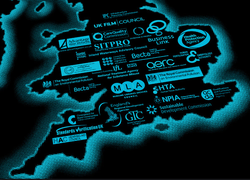Difference between revisions of "Quango"
(Created page with "{{concept |wikipedia=https://en.wikipedia.org/wiki/Quango |constitutes= |description= |image= |start= }} {{SMWDocs}} ==References== {{Reflist}} {{Stub}}") |
(unstub) |
||
| (One intermediate revision by one other user not shown) | |||
| Line 1: | Line 1: | ||
{{concept | {{concept | ||
|wikipedia=https://en.wikipedia.org/wiki/Quango | |wikipedia=https://en.wikipedia.org/wiki/Quango | ||
| − | |constitutes= | + | |constitutes=organization type |
| − | + | |image=Quango.png | |
| − | |image= | ||
|start= | |start= | ||
| + | |sourcewatch=http://www.sourcewatch.org/index.php/Quango | ||
| + | |description=It describes an ostensibly non-governmental organisation performing governmental functions, | ||
}} | }} | ||
| + | The term '''quango''' or '''QUANGO''' is a (normally pejorative) description of an organisation to which a government has [[devolution|devolved]] power, but which is still partly controlled and/or financed by government bodies. The term was originally a shortening of "Quasi-NGO", where NGO is the standard acronym for a non-government organization, and in this sense was used neutrally. | ||
| + | |||
| + | As its name suggests, a quango is a hybrid form of organization, with elements of both [[non-government organization]]s (NGOs) and [[public sector]] bodies. The term is most often applied in the [[United Kingdom]] and, to a lesser degree, [[Australia]], [[Canada]], [[Republic of Ireland|Ireland]], [[New Zealand]] and other English-speaking countries. | ||
| + | |||
| + | In the UK, the term quango covers different "arm's-length" government bodies, including "[[non-departmental public bodies]]" (NDPBs), [[non-ministerial government departments]], and [[executive agencies]].<ref>https://www.gov.uk/government/organisations |title=Departments, agencies & public bodies - Inside Government </ref> | ||
| + | |||
| + | Examples include the [[Bank of England]], the [[BBC]] World service, and the Arts Council. | ||
| + | |||
| + | ===United Kingdom=== | ||
| + | Despite a 'commitment' from the 1979 Conservative party to curb the growth of non-departmental bodies, their numbers grew rapidly through their time in power throughout the 1980s. | ||
| + | |||
| + | The Cabinet Office 2009 report on non-departmental public bodies found that there are 766 NDPBs sponsored by the UK government. | ||
| + | The number has been falling: There was 827 in 2007 and 790 in 2008. The number of NDPBs has fallen by over 10% since 1997. Staffing and expenditure of NDPBs have increased. They employed 111,000 people in 2009 and spent £46.5 billion, of which £38.4 billion was directly funded by the Government.<ref>http://www.parliament.uk/business/publications/research/key-issues-for-the-new-parliament/decentralisation-of-power/quangos/</ref> | ||
| + | |||
| + | |||
{{SMWDocs}} | {{SMWDocs}} | ||
==References== | ==References== | ||
{{Reflist}} | {{Reflist}} | ||
| − | |||
Latest revision as of 01:15, 26 March 2021
(organization type) | |
|---|---|
 | |
| It describes an ostensibly non-governmental organisation performing governmental functions, |
The term quango or QUANGO is a (normally pejorative) description of an organisation to which a government has devolved power, but which is still partly controlled and/or financed by government bodies. The term was originally a shortening of "Quasi-NGO", where NGO is the standard acronym for a non-government organization, and in this sense was used neutrally.
As its name suggests, a quango is a hybrid form of organization, with elements of both non-government organizations (NGOs) and public sector bodies. The term is most often applied in the United Kingdom and, to a lesser degree, Australia, Canada, Ireland, New Zealand and other English-speaking countries.
In the UK, the term quango covers different "arm's-length" government bodies, including "non-departmental public bodies" (NDPBs), non-ministerial government departments, and executive agencies.[1]
Examples include the Bank of England, the BBC World service, and the Arts Council.
United Kingdom
Despite a 'commitment' from the 1979 Conservative party to curb the growth of non-departmental bodies, their numbers grew rapidly through their time in power throughout the 1980s.
The Cabinet Office 2009 report on non-departmental public bodies found that there are 766 NDPBs sponsored by the UK government. The number has been falling: There was 827 in 2007 and 790 in 2008. The number of NDPBs has fallen by over 10% since 1997. Staffing and expenditure of NDPBs have increased. They employed 111,000 people in 2009 and spent £46.5 billion, of which £38.4 billion was directly funded by the Government.[2]
An example
| Page name | Description |
|---|---|
| Bill Morris |
References
- ↑ https://www.gov.uk/government/organisations |title=Departments, agencies & public bodies - Inside Government
- ↑ http://www.parliament.uk/business/publications/research/key-issues-for-the-new-parliament/decentralisation-of-power/quangos/